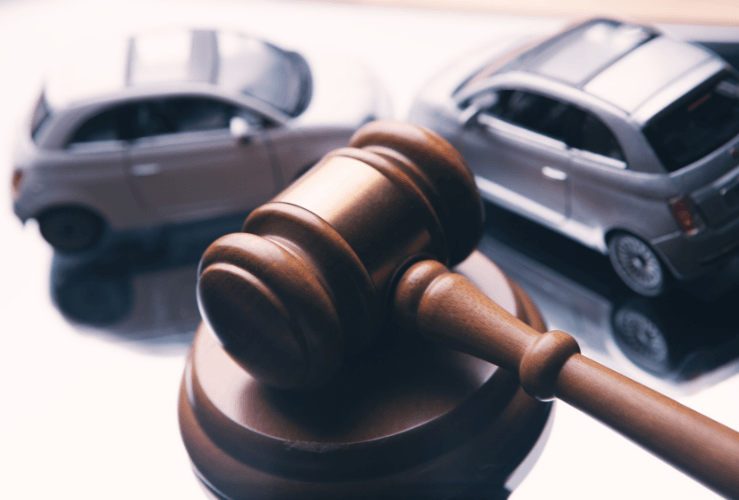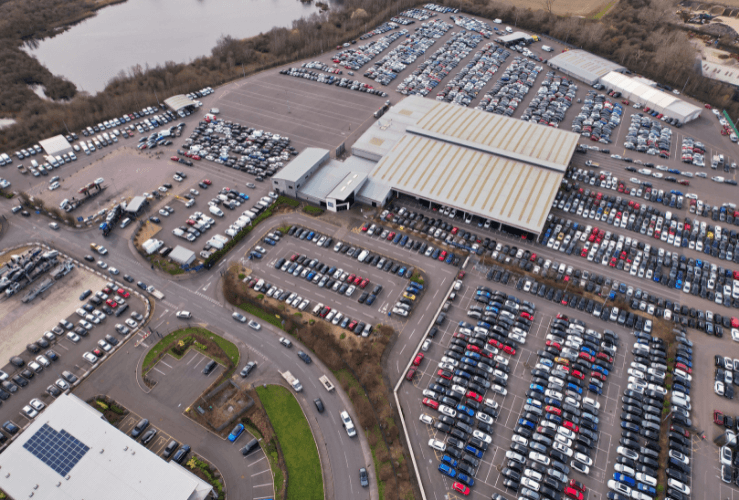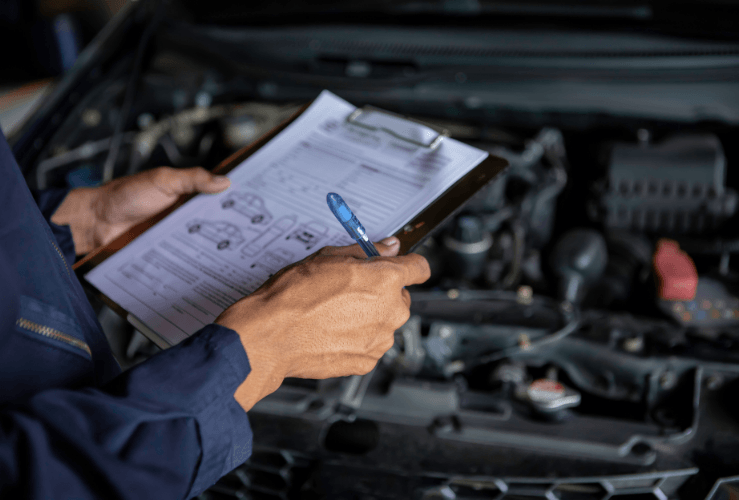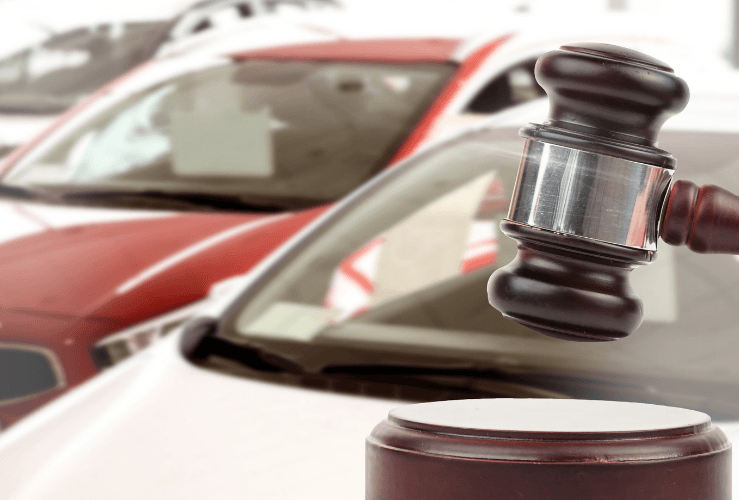Learn how to inspect, research, bid on, pay for and take delivery of a car at auction, with our complete guide.
Car auctions can be rather daunting places for the uninitiated. But understanding how the auction process works will help you take advantage of the lower prices that cars are often sold for at auction venues.
And for those who become acquainted with how car auctions work, buying a car at auction can be enjoyable too.
In this complete guide we'll take you through every step of the car auctioning process.

What are car auctions?
There are two main types of car auction, online and a physical car auction house, this article we’ll be focusing on buying a car at an auction house.
At a car auction house, cars are presented and people are invited to bid on them.
The cars, referred to as ‘lots’ at an auction are listed in a catalogue and will be presented in the order in which they appear within this catalogue.
Car auction sales can be frantic affairs, with lots selling fast. So if you find a car you are interested in buying, you’ll have to act quick to secure the vehicle you want.
British car auctions: A good way to buy cheap cars?
When it comes to buying a car at auction, it's entirely possible to grab a bargain vehicle for a few hundred pounds.
That said, final auction prices can range from £100 to £50,000 or more.
A typical car auction will have everything from city runabouts to luxury saloons. Some cars available at auctions will be many years old - others may be nearly-new.
Car auctions UK: Why are they cheaper?
Buying a car at auction is generally cheaper because you're cutting out the 'middleman' - i.e. the dealership.
Auction cars for sale: Who buys them?
In most (but not all) cases, any member of the public or business can bid on auction cars for sale. In reality, many buyers are car dealers looking to sell cars on for a profit. As a rule of thumb, auction cars are around 20% cheaper than they would be on a dealer's forecourt.
But, as mentioned, as an individual member of the public, there's nothing to stop you attending most car auctions and trying to get a low-cost vehicle for yourself.
Can I attend any car auction as a private bidder?
No. Some auction houses sell only to 'trade buyers' - which are essentially dealers (dealerships) of various types. For example, BCA Auctions only allows trade buyers to set up buying accounts. Note that some online car auctions are for both public and trade buyers, and some are only for trade buyers.

Car auctions near me
If you plan to bid and buy a car online without seeing the car in question, then the location of the auction house matters less (although taking receipt of the vehicle may take longer if the auctioneers are a long way away).
However, if you wish to inspect the car(s) before bidding, find a local auctioneer by searching ‘car auctions near me’ or similar.
Car auctioneers are located across the UK - often outside big population centres because they require a large expanse of land to operate.
Beforehand: online car auction listings
Prospective buyers don't, generally speaking, turn up to an auction and bid on a car without seeing the car online first.
Auction houses will list cars online for a certain period, giving people a chance to think over the pros and cons of a particular vehicle - or vehicles.
The pandemic saw a huge increase in online car auction purchases, as opposed to buying in person. However, while Covid-19 arguably grew the online aspect of car auctioneering, there's nothing like being able to see, hear - and even smell - a vehicle before deciding to bid on it.

Essential Auction Preparation Checklist
To make the most of your visit to a car auction, preparation is key. Use this checklist to avoid costly mistakes:
Research the makes and models you're interested in ahead of time
- View the auction listings online and note any vehicles that catch your eye
- Check each car’s MOT status and history online using the registration number
- Arrive early for a thorough inspection and look for mismatched panels, deflated tyres, and paint inconsistencies.
- Bring ID and proof of address to register as a private bidder
- Ensure your phone is charged for checking listings and running HPI and MOT checks on site
- Set your maximum bid for each vehicle before the auction begins
- Factor in buyer’s premiums and post-auction costs like repairs or delivery
- Make a note of each vehicle’s starting price and compare it to similar listings online or at dealerships to judge value
Pre-auction inspection: arrive early
Looking at listed cars online before an auction is all very well, but there's nothing like being able to inspect vehicles in person. To do this you need to arrive at the car auction house early, so you have enough time to have a good look.
Most car auction houses open for pre-auction inspections before 9am.
While a vehicle may look good online, an in-person visual inspection may reveal flaws that were not mentioned in the listing - or not apparent from the photos.
Look for warning signs
From deflated tyres to shoddy paint jobs - such issues will be apparent come auction day - but you must turn up early so you can have a good look at the wares on offer. And by arriving early there'll be fewer crowds, so you'll be able to carry out inspections of the cars at your own pace, without tripping over other would-be bidders.
When it comes to buying cars at auction, it's not advisable to bid on a vehicle you have not seen in person - or you may find some nasty surprises when you get it home (assuming it doesn’t break down on the way!).
What things should you look for during your in-person inspection?
Mismatching bodywork panels
This suggests there has been some serious work done to the vehicle - and it may have been in a collision.
Look for paintwork mismatches and shoddy shut lines.
Low quality repaints
This is probably just an aesthetic issue, although some paint touch-ups are done to disguise rust.
Deflated tyres
You'll have a hard time getting your new vehicle back on a flat tyre.
If in doubt, walk away
If you spot a series of flaws in a particular vehicle, it's probably best to walk away - even if you think you're missing out on a bargain. And don't forget, there will be scores of other vehicles to choose from on auction day.
Smart Bidding Strategies
Bidding at a car auction can be fast-paced and competitive, so having a clear strategy is crucial. Here are some smart tactics to keep in mind:
- Set a firm budget before the auction begins. Remember to account for the buyer’s premium and any necessary repairs.
- Know the vehicle’s potential value and don’t get carried away by the excitement.
- Always walk in with a maximum bid in mind based on the car’s condition, history, and mileage.
- Watch a few auctions first. Observing how the auctioneer works and how bids progress will help you spot patterns and time your bids more effectively.
- Start low – you never know if others will hesitate. Many cars open at a low starting price, so it’s worth getting involved early.
- Don’t be afraid to walk away. Bidding wars can push prices beyond the car’s worth. If your maximum bid is reached, stop. There will always be another used car on offer.
- Bring a friend to help keep you grounded and offer a second opinion – ideally someone who knows their way around a test drive or has experience at a car auction.
What to Do After Winning an Auction
Once your bid is successful, several important steps must follow to ensure a smooth handover:
- Head to the cashier’s office to pay the deposit – typically £500 or 20% of the sale price, whichever is greater.
- Settle the remaining balance by the deadline (usually within 24–48 hours). Payment methods vary, so check what is accepted in advance.
- Arrange either collection or delivery of the vehicle. If collecting, ensure it’s roadworthy and taxed before driving it away.
- Transfer of ownership should be handled promptly. Auction houses usually help with notifying the DVLA, but you must ensure the V5C logbook is completed and submitted.
- If you’re unfamiliar with the vehicle, take time for a thorough inspection or even a test drive once it’s in your possession. This will help you spot any issues early.
- Double-check the car’s MOT, tax status, and insurance before taking it on the road – especially for a used car that hasn’t been recently driven.
Car auction house gradings: get to know them
Grading scales are used by British car auction houses to assess each vehicle going to auction. It’s important to understand how these work.
Cars are graded from 1 to 5. There's also an 'unclassified' grade for cars that have extremely high mileage or are very old.
Grade 1
Grade 1 is awarded to vehicles in the best condition, perhaps requiring minor repairs. e.g. small dents without paint damage; missing trim items.
Excludes:
- Any panels that need a repaint.
Grade 2
- One 'medium' body shop repair or a combination of one medium bodyshop repair and a few minor repairs.
- Up to seven minor repairs permitted, or a combination of minor repairs and small missing parts.
Excludes:
- Any car with more than one medium bodyshop repair.
Grade 3
- May have had up to four medium bodyshop repairs.
- It might need a new bumper (but two new bumpers is not acceptable for this grade).
- Up to three major bodyshop repairs are permitted for this grade.
Grade 4
- One major repair, combined with some medium and/or minor repairs.
Excludes:
- Major repairs to structural components, e.g. roof repair.
- More than one major repair.
Grade 5
- More than two major repairs and the vehicle will be classified as Grade 5.
Excludes:
- Over five major repairs.
- More than two structural repairs or two with any other damage.
- A combination of all issues above up to a maximum total of 3,500 points.
Unclassified
Older vehicles or those with very high mileage.
Low mileage does not always mean a bargain
If a car has low mileage it can often mean it is mechanically sound - but not always. Be sure to check the auction house report before deciding to bid. Additionally, if a vehicle has suspiciously low mileage it may have been ‘clocked’. Carrying out an HPI check (see below) will help find out if this is the case.
Do an MOT check
Make sure you bring along a powered-up smartphone so you can do an MOT check online for any vehicle you're interested in (or do so while browsing online beforehand).
Visit https://www.gov.uk/check-mot-status and enter the applicable registration number.
The MOT check will tell you:
- MOT expiration date (whether it has passed or failed)
- Car tax expiration date
- Vehicle make
- Date of first registration
- Year of manufacture
- Cylinder capacity (cc)
- CO2 emissions
- Fuel type
- Vehicle status
- Vehicle colour
- Vehicle type
- Wheelplan
- Revenue weight
The report will also detail any outstanding vehicle recalls related to the car in question.
Do an HPI check
HPI checks are a common tool for checking a vehicle doesn't have a hidden past.
'HPI' is actually the name of the company that offers the checking service, but it has become so commonplace it is now a generic term for checking a vehicle's past.
However, other companies do 'HPI checks'.
While an HPI check does come at a cost, it will help ensure you don't buy a vehicle that has a major fault - and won’t be a complete waste of money.
Unlike the government's MOT check, a HPI check will tell you if a car has outstanding finance, or if it has been stolen. In the case of a stolen vehicle, the police may find it and take it away - leaving you out of pocket. It is therefore important to find out this information before you part with your cash.
An HPI check will reveal if a vehicle has been cloned - i.e. the VIN and registration have been changed to cover up the fact it has been stolen.
If a car turns out to have been scrapped, it will be illegal to drive on a public road - even if it looks to be in working order.
And if a car turns out to be an insurance write-off, getting insurance for it will be difficult.
Additionally, some sellers wind back or 'clock' the odometer in order to get a better price (low mileage cars generally sell for more).
HPI check data is drawn from the DVLA, insurance firms and even the police. HPI check providers offer up to £30,000 in compensation if any of the data provided turns out to be incorrect.
Note that if information has not been shared or revealed, it won’t be present in a HPI report. An HPI check is not therefore guaranteed to uncover every single issue with a given car.
What will an HPI check tell you?
- Recorded as being scrapped by insurers
- Recorded as being written off by insurers
- Recorded as stolen (based on police data)
- If it is subject to an existing loan ('outstanding finance')
- If the log book has been stolen
- Any number plate changes
- Inconsistent mileage history
- How many previous owners it has had
How much is an HPI check?
A full HPI check costs around £20, while a more basic check costs about £10.
Before cars enter the auction room
Many modern car auction companies harness the latest technologies to help sell their vehicles.
For instance, online car auctioneers will take 3D photographs of each vehicle so would-be online bidders can see each one in detail before deciding to place a bid. Internet bidding is a key aspect of the auctioning business, so auctioneers want to give bidders as much visual and written information as possible.
A bar code sticker is applied to each vehicle. This includes all relevant information about the vehicle, and helps keep track of it in the auction house.
Watch the car as it rolls into auction
It's not possible to carry out mechanical checks, so the only chance you get to see the car moving is when it is driven into the auction room.
Make sure the engine note is smooth and there are no worrying sounds; and check the tyres.
This is another reason why attending an auction in person is arguably preferable to online bidding.

How do you bid at a car auction (in person)?
Before you can place any bids, you need to register with the auction house as a private bidder. You'll need to be over 18 and provide some form of ID.
Putting down a deposit
You'll also need to put down a deposit. This is normally £500 and will be refunded if you don't end up purchasing a car. If you do buy a car at the auction, the deposit amount will be knocked off the car's final price.
Communicating your bids at a car auction
Once your car is driven into the auction room (at which point you should observe it for faults, blue smoke, engine noise etc), it’s time to open the auction and you get the chance to start bidding.
When the auctioneer asks for a higher figure for the vehicle and you wish to place a bid, you simply raise your hand or nod your head.
Be careful when in the auction room - since you don't want to accidentally place a bid on a car you don’t want!
Tips for the car auction bidding process
- Set your price and stick to it. Bear in mind you'll need to pay a 'buyer's premium' on top - which is usually 5% of the car's final price. This fee is added to vehicles across the UK and internationally. This can be substantial; a £10,000 car would be £10,500 with the buyer's premium added.
- Take someone with you who has been to a car auction before, and ideally who has some mechanical knowledge. They will be able to help you spot value-for-money cars - and help you with the auction bidding process.
- If you can, observe the vehicle as its engine is started (before being driven to the auction room). If you see blue smoke coming from the exhaust, it suggests the engine is burning oil - which may necessitate costly repairs.
- Check for warning signs on the dashboard as the car is started. This is a quick way to discover any faults the car’s onboard computer/sensor system has detected.
- Be aware there may be a minimum price. For example, you may win the bidding for a car at £1,000, but the seller has placed a minimum price of £1,100. In this case, you would need to decide if you want to pay the additional £100.
How to pay for your new car?
If your bid is successful, go to the cashier's office. You'll then need to make an immediate deposit of 20% or £500 - whichever amount is higher. Cash or debit card is accepted. But do ensure your type of card is accepted, as some may not be.
Getting your car: collection or delivery
You'll probably have the option of either collecting your car in person, or having it delivered.
Buying for a profit?
As a private bidder you would generally be buying the car to use yourself, having undertaken any necessary repairs.
However, some buyers may be looking to sell the vehicle on for a profit. Given cars sold at auction can be around 20% cheaper than buying through a dealership, making a profit is entirely possible. However, you may need to carry out repairs, and then take the time to advertise and sell the vehicle - with all the attendant communication that involves.
Can I sell my car at auction?
Yes, it is possible for private sellers to arrange for their car to be sold via auction.
You should first find an auction house that you wish to sell with. If they are interested in selling your car, they will arrange with you, to inspect and value your vehicle ,discuss with you the estimated value of the car and set a reserve price.
Bear in mind, if you opt to sell your car via auction that there is usually an upfront fee for listing your car at the auction. You will also pay a commission to the auctioneer, based on a percentage of the sale prices. It’s also worth noting that if bids do not reach your reserve price your car won’t be sold but you may still have to pay fees.
International car auctions
If you don’t find your ideal car at a UK auction, you might consider buying internationally.
Used cars in Japan, for example, have a reputation of being well cared for. Indeed, you may be able to pick up a bargain in Japan, even when you factor in shipping/import costs.
Help from experienced international buyers
It can be daunting to bid on a car auction somewhere as far away as Japan, but there are experienced international buyers who can do the bidding for you.
Car auctions Japan: Get a full auction report
While most Japanese used cars are in good condition, it's important to get a full auction report before you buy. This will highlight any repairs of potential issues with the vehicle. You may need to get the auction report translated.
You should also understand the Japanese auction report codes. For example, if a vehicle has the 'RA' code, it has had some minor body damage in the past. With this knowledge, you can examine the car to see how well the repairs were done.
How long does it take to ship a car from Asia to Europe?
The entire process can take up to 10 weeks. But the time and effort is often considered worth it if it means getting behind the wheel of an iconic car.
Will the industry change to online car auctions entirely?
Many would-be buyers want to see vehicles up-close before they decide to place a bid.
For example, G3 is a new 14-acre site in Leeds, dedicated to auctioning used cars the old-fashioned way - with people coming in and being able to inspect vehicles before bidding. Naturally, this is backed up with 3D imaging and online listings, so people can browse cars online before deciding to visit the auction house.
G3's owner, Matt Dale, spoke to Car Dealer Magazine on the subject.
"We're very much a physical-first in terms of what we're trying to do...speaking to the buyers, the buyers still want to be able to come and touch and feel the vehicles. So we think it’s a wise investment... to invite those physical buyers as well as the online buyers."
What's the future of car auctions?
Mike Brewer was asked by Car Dealer Magazine about the future of car auctions.
Mike said, "The future for car auctions is both. The need for a physical auction is always going to be there. Obviously online auctions are playing a massive part in the way the car world works - especially in my world - the classic car world: classic car auctions online are doing phenomenally well.
"But there is still this need for people to get out there and touch the metal."





